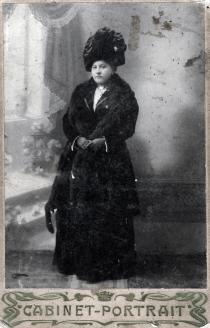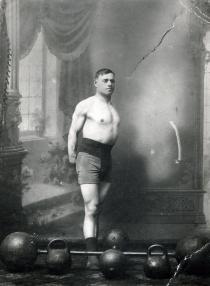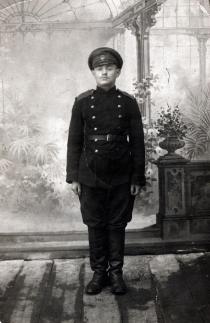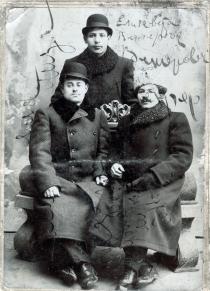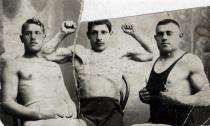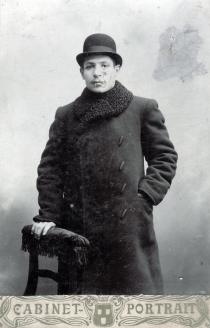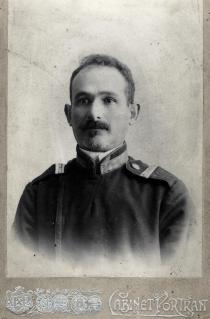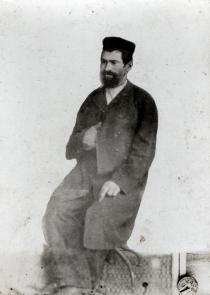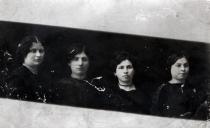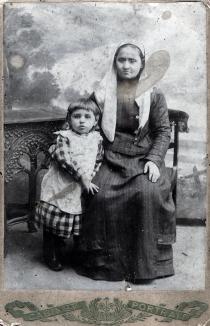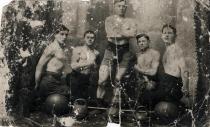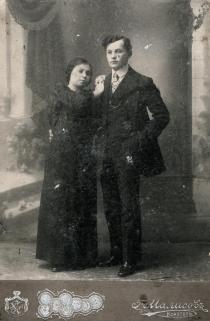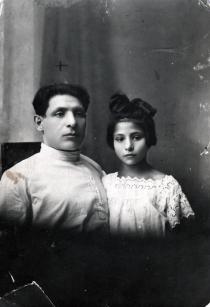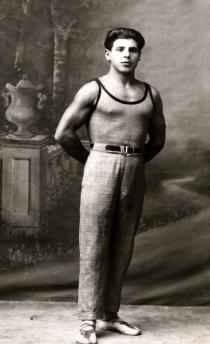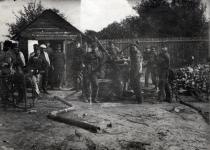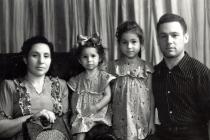From left to right: an unknown relative, Beile Lurye - the wife of my uncle Meishke, my mother Chaya Gurevich (nee Lurye), my aunt (my mother's sister) Rokhl Gopina (nee Lurye). 1912 ; Konotop.
Unfortunately, Meishko was a sportsman and died at the age of 37 because of a heart disease. Then Avram and Shlemka began to provide for his family (two daughters and wife Beilya). Soon, Avram got sick with leukemia. He died either in 1932 or 1933. He left son Boris (named in honor of grandfather), daughter Fruma (named in honor of grandmother), and the wife. So, Shlemka alone provided for his own family and the families of his brothers.
My mother, Chaya Borukhovna Lurye, was born in 1885 in Konotop. She was not tall; she had blue eyes and blond hair. I think she finished cheder, because she was quite literate in Yiddish. I also think she learned Russian on her own. Just like everybody else in the family, she was quite religious; she had a special seat in the synagogue. When she went to the synagogue, she wore a special outfit. I remember she had a scarf, which was beautiful. Mother always celebrated all Jewish holidays. She was a fanatic before the war, but not after the war. We never ate pork at home. We always prepared to every holiday. In autumn she bought geese and fed them well until Passover. Before Passover, no matter what the weather was, she hired somebody to whitewash the whole house. Then she cleaned the house of all "khumyts" (leaven; according to the Jewish tradition, there should be nothing made of leaven in the house on Passover). We had special crockery for Passover. We always made special Passover wine of cherry. My mother made huge jars of such wine. My grandparents would come to the first Passover seder. We all sat around a big table, and there were a lot of delicious things on the table - so many that I don't even know how people could eat all of them! There was stuffed fish and other delicious things. Foods for the whole Passover week were cooked on geese fat only. My mother also had a lot of pans and she cooked things with fat, with flour, with poppy, and with matzos. Special people baked matzos for Passover. At the seder, my father sat on special pillows, and brother Boris asked the four traditional questions (he studied in cheder for some time, but there were no cheders after the revolution). For the whole evening people would sit there, eat and tell interesting stories. All of this was done in Yiddish. We all spoke Yiddish at home. Yiddish was the native language for all of my relatives.
I also remember there was a holiday when a chicken was rotated over head. Mother would give us all chickens, then she would put them in a basket and I went through the town to shoichet (Jewish butcher). Mother told me how a chicken's head should be put under the wing so that there would be no blood. She trusted me with money to pay the shoichet, even though I was only ten years old. But we were very independent at that age; mother taught us to do everything: clean the flat, wash windows (every ten days), clean the dust, and wash every leaf of the plants we grew (she liked them). We baked bread every week. She bolted flour and made dough, and I had to knead dough with my fists. I once asked her, "How long should I be doing this?" and my mother answered, "Until beads of sweat appear in the other corner of the room. Every Friday we did a major cleaning of the house. Mother was a housewife. She only hired a babysitter when she gave birth to two twins. When I was born there was no babysitter. There were no water pipes, and when we had to wash we brought water from the well. In summer we carried water ourselves, but in winter we hired a special man. In winter we washed clothes in the river in ice-holes. We carried things on slides. We always were clean. We also washed in bath once a week.
Mother had very good music ear - she sang and danced well. When she was young she was invited to Jewish weddings. She liked both Jewish and Ukrainian songs. Aunt Soreh-Liba's son once said, "When aunt Chaika comes, no actors are needed - people will be listening to her alone"
My mother and her brother Shleimka, unlike other relatives, lived for a long time. Mother died in Kiev in 1978 at the age of 93.

